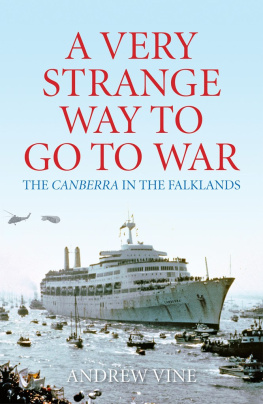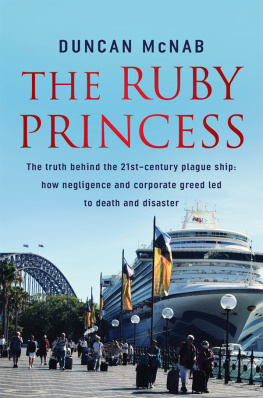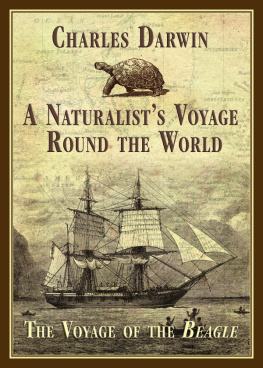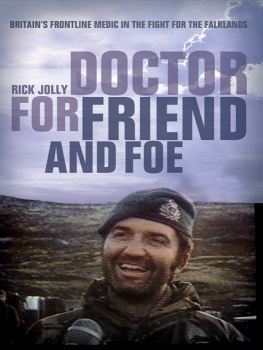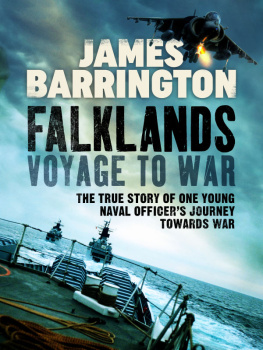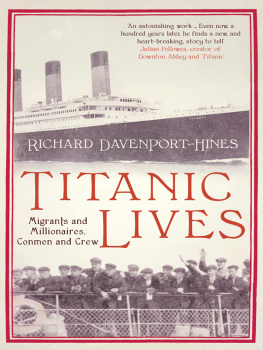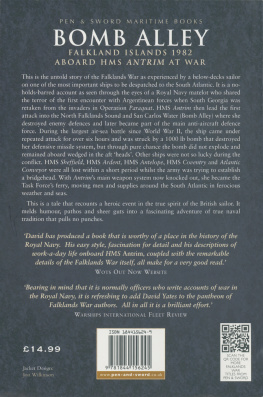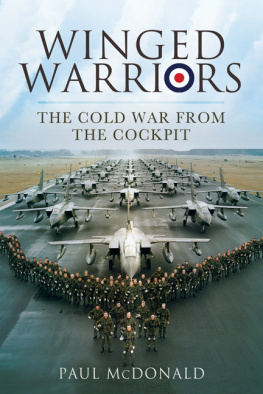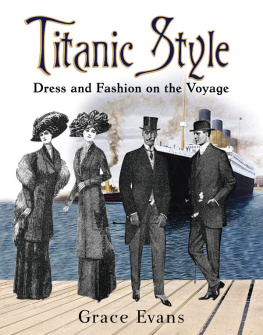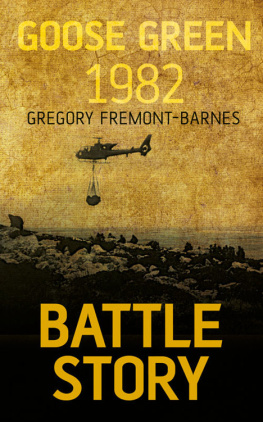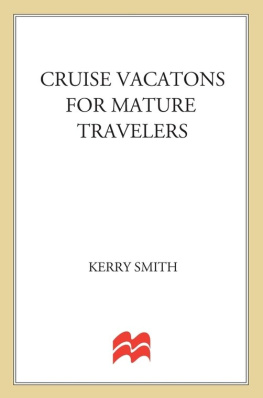A Very Strange Way to Go to War
First published in 2012
by Aurum Press Ltd, 7 Greenland Street, London NW1 0ND
This eBook edition first published in 2012
All rights reserved
Andrew Vine, 2012
The right of Andrew Vine to be identified as author of this work has been asserted in accordance with Section 77 of the Copyright, Designs and Patents Act 1988
This eBook is copyright material and must not be copied, reproduced, transferred, distributed, leased, licensed or publicly performed or used in any way except as specifically permitted in writing by the publishers, as allowed under the terms and conditions under which it was purchased or as strictly permitted by applicable copyright law. Any unauthorised distribution or use of this text may be a direct infringement of the authors and publishers rights, and those responsible may be liable in law accordingly
eBook conversion by CPI Group
ISBN 9781845138462
For my brother, John
There is but one sea service. It is manned by those who use the sea. In peace-time it may be convenient to make division into Navy, Merchant Service and Fishing Fleet. In all national emergency, these services naturally become one, and serve as one.
John Masefield
She drove foaming to the southward, as if guided by the courage of a high endeavour.
Joseph Conrad
We Dont Want to Join the Army
IT WOULD BE a highlight of the closing days of the world cruise as Canberra steamed homewards to Southampton the crew show, weeks in the planning, in which the men and women who had pampered 1,600 well-heeled passengers for once took the starring role, putting on the greasepaint and the style, stepping into the spotlight with sketches and songs and lapping up the laughter and applause. It was a way of bidding goodbye to passengers they had come to know well, a chance also for their guests to store away another memory, take a few more snapshots for the album perhaps to reflect that a generous tip was in order before leaving. Rehearsals had gone well and everybody involved was buzzing with anticipation. Two houses were planned to accommodate everybody who wanted to see it, climaxing with a quirkily offbeat production number, thanks to the discovery somewhere in the bowels of the ship of a cache of archaic items left over from goodness knows when.
It was nothing more than an eye-catching bit of fun, a novel idea for a finale, all part of the service across the course of 90 days of indulgence for passengers on the voyage they had promised themselves all their lives. Cold, grey, uncertain Britain, bumping on its backside along the bottom of an economic slump, beset by industrial unrest and political friction, had been left behind on Wednesday 6 January 1982. Canberra was the passengers transport of delight, her own world, making their dreams of glamorous and romantic travel come true. She was the epitome of ocean-going splendour as she eased away from berth 106 at Southampton at 8pm, the deep-throated boom of her whistle reverberating across the port to announce that one of the most majestic and distinctive liners in maritime history was once more under way and setting course for the sun. A little over a month before, just before she departed for a two-week Christmas cruise, Canberra had undergone overhaul and refurbishment, and she was magnificent. Her hull had been cleaned and painted, so she was gleaming white; the twin funnels aft were vivid yellow. Her interiors were pristine, with new carpets and soft furnishings, her colour schemes all warm soothing tones, her armchairs deep and inviting, her cabins comfortable and welcoming, her crew smiling and attentive, her guests returning from their evenings to beds turned down, lights dimmed, chocolates and drinks set out. The wooden panelling of the public rooms was polished to such a gloss that the gentlemen could just about use it to check if their ties were straight before going into dinner and the decks were as spotless as the crews whites. First port of call was Madeira, then on to Bermuda, Florida and into the Pacific; she would enter Sydney Harbour once more, evoking memories of her glorious maiden voyage of 1961, tour the Far East and head home via the Indian Ocean and the Suez Canal, due to arrive at 7.30am on Wednesday 7 April, having steamed more than 30,000 miles. Ten days later, her cruise programme for the rest of the year began, taking her on two-week passages to the Mediterranean, the Fjords, the Canaries, the Holy Land, Mexico and California, before she once more headed to Australia for a series of voyages out of Sydney that would take her into 1983.
The P&O brochures for the 1982 season promised The Magnificent World of Canberra, and so it was, a floating city and adult playground devoted to the leisure and pleasure of its guests, a quintessentially British ship, a corner of home cruising around the globe in style, run by the sort of men one could depend upon. The Bridge Where British Officers keep watch, declared the brochure, for the avoidance of doubt; no unreliable foreign types where it mattered here, thank you very much. Under their care, the passengers luxuriated, whether lounging in the sun around the Bonito Pool or Observation Deck, or being a little more active and trying their hand at quoits or shuffleboard on the Sun Deck. For the older ones, of which there were many, feeling the need to gently stretch their legs without unduly exerting themselves, there was the invitation to Stroll a Mile With a Smile, accompanied by a cheery crew member if necessary, which meant a steady four times round the Promenade Deck. Those who preferred a more sedentary cruise opted for backgammon, Scrabble, flower arranging, sewing or bridge. They browsed in the four shops for jewellery or scent, ordered a cocktail in the Crows Nest Observation Lounge, forward of the bridge, with its semi-circular bar, spiral staircase that connected three decks, picture windows and panoramic views, where they contemplated how to spend the evening, after dinner in the Pacific Restaurant for those in the best cabins, or the Atlantic Restaurant for the rest. Would it be a show in The Stadium, just aft of the Crows Nest, perhaps one of the themed events such as Cafe de Paris Night or Race Night, or cabaret with class acts in the more intimate surroundings of the Bonito Club? First-run films were showing in the cinema, there was a disco in the Island Room, and for those who liked their dancing rather more intimate, the Peacock Room beckoned, where, if the brochure was to be believed, Cupid was on hand as part of the service: Here youll find the sort of romantic nightclub where you can dance cheek to cheek, fall in love with love all over again, and be forgiven for thinking that youre the only two people in the world.
Life was rather less leisurely for the 800 crew. Running the ship, maintaining her immaculate appearance and catering to the passengers whims meant hard work and long days. For all that, they enjoyed their jobs. Canberra was more than a workplace for many; it was home from home, as familiar as where they lived on shore. Cabins had been personalised with trinkets and pictures and curtains by crew who had served for years; they knew every inch of this ship, every creak of her woodwork when she hit a swell. They also knew her quirks and her qualities, and took affectionate pride in both. If passengers hearts skipped a beat at their first sight of Canberra, so too did the crews whenever they returned to her. This was a true community, with its characters and quarrels, its own social divisions, but above all with a real sense of identity. There were parties and smiling group photos; birthday celebrations and meals together. Being at sea for long periods fostered closeness; lifelong friendships were born and lovers, sometimes soulmates, found. One couple had even married on this voyage, when the ship called at Hawaii. Nevertheless, three months away took its toll. The world cruise was always tiring, and the period of leave due at its end looked ever more inviting as the days ticked away towards Southampton. They called it having The Channels, the pull of home on the return leg, the yearning to be there intensifying the closer it grew. Thoughts turned to seeing loved ones again, to finding out how the kids were getting on at school, to pottering about in the garden, to just being off duty and catching up on some sleep. Before that release, though, the senior officers needed to turn their attention to how the cruise had progressed. P&O managers were joining the ship at her final port of call, in Italy, for a conference about the voyage to chew over what had gone well, or could be improved; above all to plan the future of the pride of the companys fleet, its flagship.
Next page
